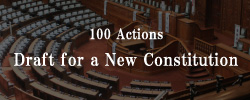- HOME
- Archives
Action 16. Enhance Diplomatic Infrastructure that Serves as the Foundation to Achieve the National Interests in Diplomacy!
Diplomatic infrastructure must be developed to enable Japan to clearly express its will as a nation, set its own diplomatic agenda, take a leadership role, and increase its presence within the international community. It is important for the government to play a role as the command center and prioritize the resources of the Foreign Ministry through selection and concentration. It is also important to make effective use of all available resources, including politicians and private parties, as part of the “infrastructure” of Japanese diplomacy.
1. Establish a National Security Council and Strengthen the Intelligence-related Functions that Will Serve as its Foundation!
The first thing to do to develop diplomatic infrastructure is improve the command center residing in the government and systems to support it. The Abe Cabinet inaugurated at the end of 2012 established a National Security Council (NSC) and developed a system to accumulate information collected from different ministries at the NSC, based on which the council makes decisions on security policy. I have no objection to commending this effort. However, information is only provided by the Cabinet Intelligence and Research Office and the information department of the Public Security Intelligence Agency, as it has always been. Japan should establish its own version of the Central Intelligence Agency in order to enhance its intelligence-related functions, which play a vital supporting role in formulating strategies and implementing policies.
2. Enhance the Diplomatic Power of Politicians!
The second effort needed to develop diplomatic infrastructure is to enhance the diplomatic power of politicians. It is worth mentioning that Prime Minister Shinzo Abe delivered a keynote speech at the World Economic Forum and the ISSI Asia Security Summit in 2014. His delivery of these speeches has significantly improved the way other countries view Japan.
Many leading Japanese government officials and cabinet ministers are tied down by the demands of parliamentary debate and are left with insufficient time to participate in diplomacy. To improve this dysfunctional system, the practice of demanding the presence of all cabinet ministers in sessions of the Budget Committee should be rectified and an environment created wherein the Prime Minister, Minister of Foreign Affairs and other related cabinet ministers can participate in diplomacy with due flexibility.
3. Reform Diplomatic Organizations and Embassies!
The third effort needed to develop diplomatic infrastructure is to enhance the systems of the Ministry of Foreign Affairs and diplomatic establishments abroad. The amount of human resources that can be allocated to diplomacy should be limited. However, since this is an area that directly affects the national interests of Japan, I think it is necessary to invest resources in emerging economies and other nations whose power is increasing in order to strengthen the system to implement diplomacy. As of the end of FY 2013, the number of Japanese diplomatic establishments abroad was 204, which is less than those of other major countries, namely, the 277 diplomatic establishments of the United States and the 254 of China. Japan needs to increase the number and improve the quality and systems of overseas diplomatic establishments to protect Japanese people in response to the recent increase in the risk of international terrorism as well as enhancing the capability for intelligence collection.
4. Utilize Private-Sector Expertise and Human Resources!
The last effort needed to develop diplomatic infrastructure is to expand the use of private-sector expertise and human resources. The government should expand the scope of the political appointee system to allow experts in foreign relations, economic diplomacy, and national security policy to participate in the processes of policy formation and coordination. The U.S. Ambassador to Japan, John Roos (2009-2013), and the U.S. Ambassador to Australia, Jeffrey Bleich, are both friends of President Obama. It is said that they underwent three months of training before assuming their ambassadorial posts. Their private-sector backgrounds have served them well as ambassadors to friendly countries, as was amply proven by “Operation Tomodachi,” the relief program launched by the United States after the Great East Japan Earthquake.
To formulate and execute excellent foreign policy strategies, the government needs to develop policy research institutes (including universities) and policy-related human resources (researchers and practical experts). In addition to the improvement of the overall level of Japan’s diplomatic policies, strengthening of the international human networks, and stimulation of policy debate, these institutes are expected to provide a space for “revolving doors” that link the government, the bureaucracy, private companies, and academia, serve as a talent pool of policy experts who can function as political appointees, and offer an arena for Track II diplomacy.
| Tweet |
Jul 08 / 2016
- Category
- Foreign Affairs
- Comments
- Comment


